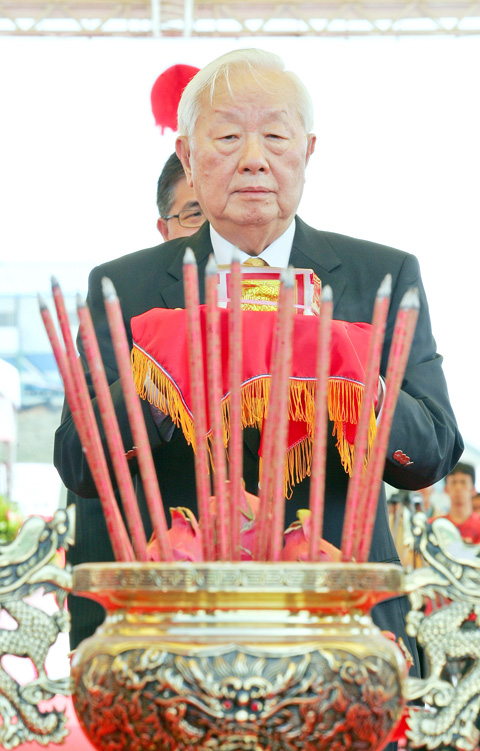Taiwan Semiconductor Manufacturing Co (TSMC, 台積電), the world’s largest contract chip maker, yesterday said it planned to spend more than NT$300 billion (US$9.34 billion) over the next few years to invest in a new chip plant in Taichung, which would create 8,000 jobs.
The company yesterday held a groundbreaking ceremony for the new semiconductor fabrication plant, or “Fab 15,” in Taichung, which was conducted by chairman and CEO Morris Chang (張忠謀).
The new facility will incorporate solar power and LED lighting with a goal of zero greenhouse gas emissions, Chang said.

PHOTO: BLOOMBERG
Fab 15 is set to create the 8,000 jobs as TSMC seeks to hire talented workers to run the fab, Chang said in a statement.
Mark Liu (劉德音), senior vice president of operations, told Bloomberg Newswires before yesterday’s ceremony that the company expects to hire up to 4,000 engineers at the site.
The factory will be TSMC’s third so-called “gigafab,” or fab with production capacity of more than 100,000 12-inch wafers per month.
It will also be the company’s second Gigafab equipped for 28-nanometer technology, the company said in the statement.
Construction of the new fab will be divided into four phases — with the first phase to start in June next year. The total investment for the fab would exceed NT$300 billion, the company said.
The fab is expected to start churning out 40nm and 28nm technology products for customers in the first quarter of 2012. More advanced process nodes will follow, it added.
The chipmaker also said yesterday that it would continue to expand capacity at its Fab 12 in Hsinchu and Fab 14 in Tainan.
“Combined capacity of Fab 12 and Fab 14 currently exceeds 200,000 12-inch wafers per month, and the total number will exceed 240,000 by the end of this year,” the statement read.
TSMC, whose clients include Qualcomm Inc and Nvidia Corp, is expanding quickly after posting record sales last quarter amid soaring global demand for computers and digital electronics.
Chang said last month the company was likely to increase capital spending again from a record high of US$4.8 billion to match the pace of a faster-than-expected recovery in electronics demand.
TSMC started increasing capital expenditures in September when it detected that a swift rebound was causing capacity constraints, bringing last year’s capital spending to US$2.7 billion in total, almost double the originally planned US$1.5 billion.
“TSMC is building out capacity now which will be yet another drag on margins over the near-term,” Bank of America Merrill Lynch said in a research note on July 12.
While the Taichung fab would focus on solar business, TSMC is also building its first LED fab in Hsinchu and expects it to be ready for mass production in the first quarter of next year, the note said.

Sweeping policy changes under US Secretary of Health and Human Services Robert F. Kennedy Jr are having a chilling effect on vaccine makers as anti-vaccine rhetoric has turned into concrete changes in inoculation schedules and recommendations, investors and executives said. The administration of US President Donald Trump has in the past year upended vaccine recommendations, with the country last month ending its longstanding guidance that all children receive inoculations against flu, hepatitis A and other diseases. The unprecedented changes have led to diminished vaccine usage, hurt the investment case for some biotechs, and created a drag that would likely dent revenues and

Global semiconductor stocks advanced yesterday, as comments by Nvidia Corp chief executive officer Jensen Huang (黃仁勳) at Davos, Switzerland, helped reinforce investor enthusiasm for artificial intelligence (AI). Samsung Electronics Co gained as much as 5 percent to an all-time high, helping drive South Korea’s benchmark KOSPI above 5,000 for the first time. That came after the Philadelphia Semiconductor Index rose more than 3 percent to a fresh record on Wednesday, with a boost from Nvidia. The gains came amid broad risk-on trade after US President Donald Trump withdrew his threat of tariffs on some European nations over backing for Greenland. Huang further

Macronix International Co (旺宏), the world’s biggest NOR flash memory supplier, yesterday said it would spend NT$22 billion (US$699.1 million) on capacity expansion this year to increase its production of mid-to-low-density memory chips as the world’s major memorychip suppliers are phasing out the market. The company said its planned capital expenditures are about 11 times higher than the NT$1.8 billion it spent on new facilities and equipment last year. A majority of this year’s outlay would be allocated to step up capacity of multi-level cell (MLC) NAND flash memory chips, which are used in embedded multimedia cards (eMMC), a managed

CULPRITS: Factors that affected the slip included falling global crude oil prices, wait-and-see consumer attitudes due to US tariffs and a different Lunar New Year holiday schedule Taiwan’s retail sales ended a nine-year growth streak last year, slipping 0.2 percent from a year earlier as uncertainty over US tariff policies affected demand for durable goods, data released on Friday by the Ministry of Economic Affairs showed. Last year’s retail sales totaled NT$4.84 trillion (US$153.27 billion), down about NT$9.5 billion, or 0.2 percent, from 2024. Despite the decline, the figure was still the second-highest annual sales total on record. Ministry statistics department deputy head Chen Yu-fang (陳玉芳) said sales of cars, motorcycles and related products, which accounted for 17.4 percent of total retail rales last year, fell NT$68.1 billion, or